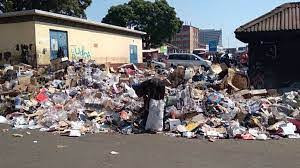
EFFECTIVE waste management in the environmental, social and governance (ESG) sense involves a holistic approach that integrates environmental considerations, social impacts, and governance practices to drive sustainable business practices and create long-term value for all stakeholders.
Last week we ended on the discussion of the importance of aligning SMART goals with broader sustainability frameworks and initiatives, such as the United Nations Sustainable Development Goals (SDGs) or industry-specific sustainability standards.
Regularly tracking progress against these goals, measuring key performance indicators, and reporting on achievements and challenges are vital for driving continuous improvement in waste management operations and demonstrating commitment to sustainability.
Aligning SMART goals with SDGs
Aligning SMART goals with broader sustainability frameworks and initiatives such as the United Nations Sustainable Development Goals (SDGs) or industry-specific sustainability standards is essential for ensuring that organisations' sustainability efforts contribute to global sustainability targets and best practices.
Here are steps to align SMART goals with these broader frameworks:
Identify relevant SDGs:
Review the United Nations Sustainable Development Goals (SDGs) and industry-specific sustainability standards to identify goals and targets that align with the organisation's mission, values, and activities.
- Unpacking environmental laws for real estate in Zimbabwe
- Veld fire management strategies for 2022
- Stop harassing media for reporting truth
- Letters to the editor: PVOs Bill must be shot down
Keep Reading
Select SDGs or standards that are most relevant to the organisation's operations, products, services, and impact areas.
Map SMART goals to SDGs:
Match each SMART goal set by the organisation to specific SDGs or sustainability standards that address similar themes or objectives.
Ensure that there is a clear connection between the organisation's goals and the broader global or industry-specific sustainability priorities.
Integrate SDGs into goal-setting:
Incorporate SDGs or relevant sustainability standards into the organisation's goal-setting process to ensure that sustainability considerations are embedded in strategic planning and decision-making.
Align SMART goals with the targets and indicators outlined in the selected SDGs or standards to create a cohesive framework for sustainability performance.
Communicate alignment and progress:
Clearly communicate how the organisation's SMART goals align with specific SDGs or sustainability standards to stakeholders, employees, customers, and partners.
Provide regular updates on progress towards meeting these aligned goals, highlighting the contributions to broader sustainability frameworks and initiatives.
Collaborate with stakeholders:
Engage with external stakeholders, such as industry associations, NGOs, government agencies, and community groups, to leverage their expertise and resources in aligning SMART goals with broader sustainability frameworks.
Collaborate with partners who share similar sustainability goals and work together towards common objectives outlined in SDGs or industry standards.
Monitor and evaluate performance:
Establish key performance indicators (KPIs) to track progress towards both SMART goals and aligned SDGs or sustainability standards.
Regularly monitor and evaluate performance against these KPIs, making adjustments as needed to stay on track towards achieving sustainability objectives.
By aligning SMART goals with broader sustainability frameworks and initiatives, organisations can enhance their impact, credibility, and relevance in advancing sustainable development goals at both the local and global levels.
This alignment demonstrates a commitment to responsible business practices, environmental stewardship, and social progress while contributing to a more sustainable future for all.
Stakeholder engagement
Engaging with internal and external stakeholders, including employees, customers, suppliers, regulatory authorities, and local communities, is key to fostering a culture of sustainability within the organisation.
Collaboration with stakeholders can lead to innovative solutions, improved waste management practices, and enhanced reputation.
Integrating sustainability and environmental metrics into waste management business operations through stakeholder engagement is crucial for ensuring that the business operates responsibly and contributes to a more sustainable future.
Here are some steps you can take to effectively integrate sustainability and environmental metrics into waste management operations through stakeholder engagement:
Identify stakeholders
Begin by identifying all relevant stakeholders in the waste management business operations.
This may include customers, employees, local communities, regulatory bodies, environmental organisations, suppliers, and investors.
Understand expectations
Conduct a thorough analysis to understand the expectations, concerns, and priorities of each stakeholder group regarding sustainability and environmental performance in waste management operations.
This can be one through surveys, interviews, focus groups, or stakeholder consultations.
Set sustainability goals
Based on the feedback received from stakeholders, set clear and measurable sustainability goals related to waste management.
These include reducing waste generation, increasing recycling rates, minimising carbon footprint, and promoting resource efficiency.
Develop KPIs
Define key performance indicators (KPIs) that will help track progress towards the sustainability goals.
These KPIs should cover environmental metrics.
These include waste diversion rates, energy consumption, greenhouse gas emissions, water usage, and other relevant indicators.
Engage stakeholders in strategy
Involve stakeholders in the development of sustainability strategies and action plans for waste management operations. Seek input from stakeholders on initiatives that can drive environmental performance improvements and enhance the overall sustainability of the business.
Implement programmes
Establish regular communication channels with stakeholders to keep them informed about the progress of sustainability initiatives in waste management operations.
Engage stakeholders through workshops, meetings, reports, newsletters, and other communication tools.
Monitor and report progress
Continuously monitor and evaluate the performance of waste management operations against the established KPIs.
Prepare regular sustainability reports that highlight achievements, challenges, and areas for improvement.
Share these reports withstakeholders to demonstrate transparency and accountability.
Seek feedback and adapt
Encourage feedback from stakeholders on the effectiveness of sustainability initiatives and be willing to adapt strategies based on their input.
Continuous engagement with stakeholders will help ensure that the business remains responsive to evolving sustainability priorities.
By following these steps and integrating sustainability and environmental metrics into waste management operations through stakeholder engagement, businesses can foster a culture of sustainability, build trust with stakeholders, and drive positive environmental impact in the waste management sector.
Investing in technology
Leveraging technology such as IoT sensors, data analytics, waste tracking software, and automation systems can optimize waste collection, sorting, recycling, and disposal processes.
Technology solutions can help businesses monitor environmental performance, track key metrics, and make data-driven decisions for sustainable waste management.
A practical approach to integrating sustainability and environmental metrics into waste management business operations through the strategic use of technology like IoT sensors, data analytics, waste tracking software, and automation systems can significantly enhance operational efficiency, optimise waste management processes, and drive environmental performance improvements.
Here are some key steps to effectively integrate technology and sustainable practices into waste management operations:
Invest in IoT sensors, automation
Deploy internet of things (IoT) sensors and automation systems across waste management processes to collect real-time data on waste generation, collection, sorting, and disposal.
These technologies can help optimize route planning for waste collection trucks, monitor bin fill levels, and automate sorting processes to improve operational efficiency and reduce costs.
Utilise data analytics for performance monitoring Implement data analytics tools to analyse the data collected by IoT sensors and automation systems.
By leveraging data analytics, waste management businesses can track key metrics such as waste diversion rates, recycling efficiency, energy consumption, and carbon footprint.
This data-driven approach enables businesses to identify trends, inefficiencies, and areas for improvement in waste management operations.
Implement waste tracking software
Adopt waste tracking software solutions that enable businesses to monitor the movement of waste throughout the value chain, from collection to final disposal.
This software can help businesses track the types and quantities of waste generated, identify opportunities for waste reduction and recycling, and ensure compliance with regulatory requirements.
Optimise waste collection
Use technology to streamline waste collection and sorting processes, such as implementing smart bins with sensors that signal when they are full, optimising collection routes based on real-time data, and automating sorting processes using robotics and AI.
These technologies can help reduce operational costs, minimize waste contamination, and improve overall efficiency.
Promote economy principles
Embrace circular economy principles by integrating sustainable practices such as product redesign, remanufacturing, reuse, and recycling into waste management operations.
Encourage the development of eco-friendly products, establish take-back programmes for used products, and collaborate with suppliers and partners to close the loop on material flows.
Collaborate with stakeholders
Engage with stakeholders, including customers, suppliers, local communities, and regulatory bodies, to align technology investments and sustainable practices with their expectations and priorities.
Collaborate on initiatives that promote waste reduction, resource conservation, and environmental stewardship to drive collective impact.
Measure and communicate impact
Continuously measure the environmental impact of technology-enabled sustainability initiatives in waste management operations. Use performance metrics and key performance indicators to track progress, evaluate the effectiveness of interventions, and communicate achievements to stakeholders through sustainability reports and communication channels.
By integrating technology, data analytics, and circular economy principles into waste management operations, businesses can optimise performance, reduce environmental impact, and drive innovation towards a more sustainable and efficient waste management system.
- Mkombachoto is a former academic and banker. She has consulted widely in strategy, entrepre- neurship and private sector development for organisations that includes but not restricted to Seed Co Africa, Hwange Colliery, RBZ/CGC, Standard Bank of South Africa, Home Loans, IFC/World Bank, UNDP, USAid, Danida, Cida and Kellogg Foundation. — @HeartfeltwithGloria, WhatsApp +263 772 236 341.






